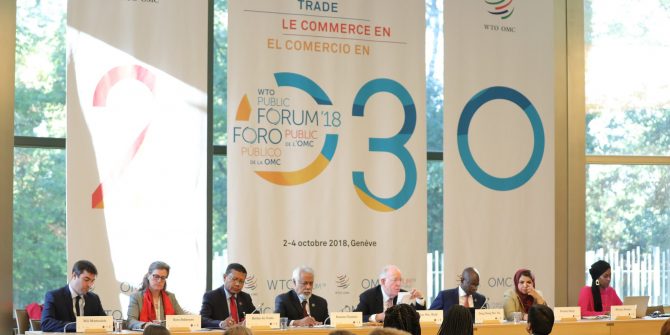Will COVID-19 cure tax ailments? In this blog, Beata Javorcik (EBRD) discusses international tax cooperation. Taxing multinational corporations and tech giants, while not easy, may prove to be politically popular. Furthermore, global cooperation in this regard is the best, if not the only, way forward, she argues.
There are lots of uncertainties about what the post-COVID world will look like, but one thing is certain: governments will emerge from the crisis with high levels of debt and will be looking for new sources of tax revenue. Tightening tax rules on multinational corporations and tech giants, while not easy to achieve, may prove to be politically popular.
We already see some signs that this is happening. Denmark and France have announced that companies registered in tax havens or having subsidiaries in tax havens are not eligible for the billions of euros of support provided by these governments during the pandemic. The current efforts are still timid, as they refer only to the EU’s list of 12 non-co-operative jurisdictions, such as Panama and the Cayman Islands, but we may see bolder moves soon.
Tightening rules on tax avoidance will find wide public support. The pandemic has invalidated the old social contract – low taxes in exchange for limited provision of the welfare state, state insurance, and social care. In the post-COVID world, the public will expect more from the state in terms of providing insurance and protection during shocks – and rightly so, as the state is better positioned than individuals to deal with large uninsurable risks. This will come at the price of higher taxes that the public will be prepared to pay as long as they are perceived as fair. And fair means that everybody is playing by the same rules.

The changing perception of the social contract predates the pandemic. Rising inequality and lower social mobility have created a sense of unfairness, particularly against the backdrop of steadily declining corporate tax rates. And high profile cases, such as the European Commission’s investigation of Apple’s tax deal with Ireland which resulted in the tech firm paying a tax of just 0.005% in 2014, have been met with public outrage. It has not escaped the public’s attention that many highly profitable companies use legal accounting schemes to shift profits to countries with low taxes. At the same time, many tech giants report huge revenues but low profits, which allows them to avoid hefty tax bills.
Legal accounting schemes employed to minimize taxes not only deprive state coffers of revenue, but they also tilt the playing field in favour of large multinational corporations at the expense of smaller domestic players. Moreover, concerns have been raised about increasing market concentration having a detrimental impact on innovation and therefore on long-term growth.
Some progress has already been achieved before the pandemic under the G20/OECD initiative on the Base Erosion and Profit Shifting. Margrethe Vestager, the European Commissioner for Competition has also been sending a strong message to potential tax avoiders. Nevertheless, according to a 2019 IMF report, despite this progress, revenue losses from tax avoidance remain substantial for many advanced economies and may be even larger for developing countries. Some of the studies, mentioned in the report, suggest profit shifting leads to double-digit losses in terms of the percentage of corporate tax revenue in G7 countries.
Once we enter the recovery stage, countries will be facing tension between the need for tightening tax rules to obtain more revenue and the need to attract investment, including foreign investment, to stimulate growth. Countries tightening rules on their own will be punished by lower inflows of foreign direct investment, so global cooperation is the best, if not the only, way forward. Last November, the OECD made a proposal to allow countries to tax operations in their jurisdiction even if companies have no physical presence there. It has also been consulting on the possibility of setting a global minimum corporate tax level. The current crisis may speed up these efforts and give countries a powerful incentive to cooperate. Ironically, COVID-19 may become a cure for global tax ailments.
This post represents the views of the author and not those of the COVID-19 blog or LSE or EBRD. Images Money, Some rights reserved.





